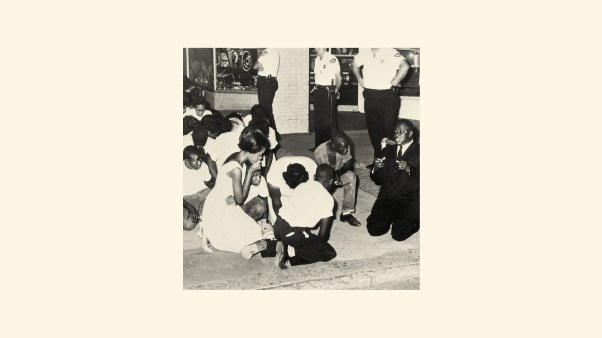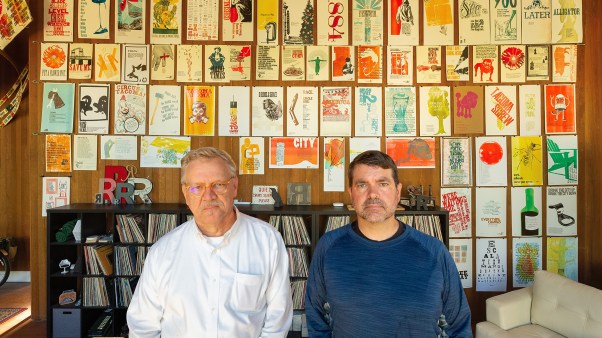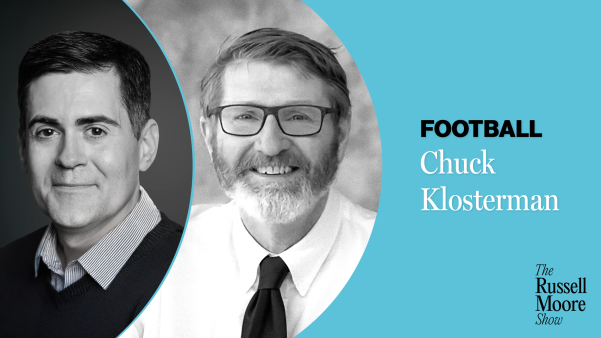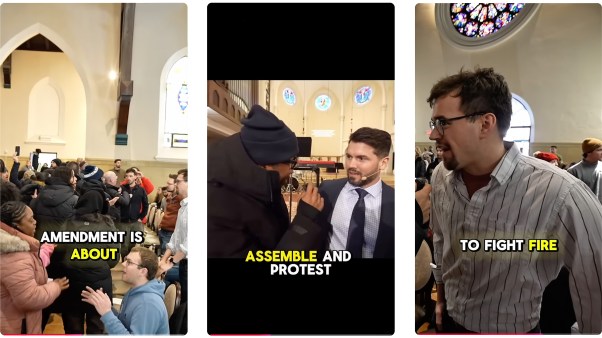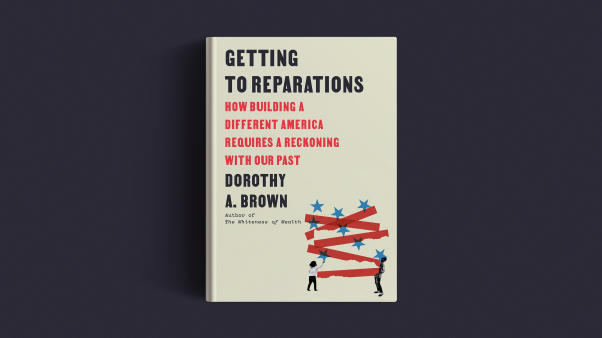Conan O’Brien Needs a Friend may seem like odd preparation for preaching. But I’ve found the podcast to be a helpful elixir as I get out of the world of sermons, commentaries, books, and conferences to think about engaging with people on Sunday. In his conversations with other comedians, Conan gets into the pathos behind entertainers’ acts and the hard work it takes to produce a simple laugh. I was struck, for instance, by Ray Romano’s admission that his father’s refusal to give him approval is what drove Ray to try so hard to get laughs, and by Howard Stern’s description of how, as a boy, he took to cracking jokes about his neighbors to help relieve his mother’s severe depression.
As with these candid conversations, the work of a pastor often involves helping people get underneath their behaviors to a deeper understanding. And preaching, at its best, can lift back the layers to help us see ourselves as we really are.
Podcasts are part of an explosion in the popularity of on-demand audio content. According to research compiled by Podcast Insights, over 1 million podcast shows and over 30 million podcast episodes are currently available for listeners. Half of American households are podcast fans, and, when surveyed earlier this year, 37 percent of the US population said they listened to podcasts in the past month. The rise of podcasts is due, in part, to the ubiquity of smartphones and the ease of accessing on-demand audio. But it also seems to be a reaction to a visual world of blips and fast cuts, of surfing and scanning, of headlines without context. It’s an underground revolution that prizes nuance, deep diving on issues, and long-form conversations that defy our incessant need for tribalism and scorekeeping.
Podcasts and the Preaching Craft
Along with Conan O’Brien Needs a Friend, I’ve learned quite a bit about crafting sermons from other forms in the podcast genre. The storytelling and pace in This American Life, for instance, help me read and understand Scripture narratives—and prompt me to consider how I retell Scripture’s stories to a congregation. I learn a lot from listening to long-form conversations between people you wouldn’t normally see together, such as David Axelrod’s interview with Mitt Romney on The Axe Files podcast. That episode allowed me to listen in on honest reflection and camaraderie between a man who ran for president and the man who organized the campaign against him. This sort of conversation challenges me to consider the approach I use when interacting with opposing viewpoints in a sermon. And documentary podcasts like Slate’s Slow Burn help me think through investigative questions and see the deeper story underneath so many stories—both of which are essential to the sermon preparation process.
I’ve also learned a thing or two from podcasts about how to actually deliver the content of sermons. For instance, listening to the way Terry Gross asks questions on Fresh Air has helped me become a better question asker in my preaching. Listening to comedians discuss the importance of cadence and timing on podcasts like Netflix Is A Daily Joke has helped me think through the cadence and timing of my sermon delivery.
When preparing to preach, I always come back to audio content that directly helps me exegete or think about biblical texts. Many of my pastor friends feel the same way. I did an informal survey on social media, asking pastors and teachers which podcasts helped shape their preaching. Some gravitated primarily toward preaching-specific podcasts that discuss the technique of exegesis, such as Monday Morning Preacher with Matt Woodley and Kevin Miller; Preaching Lab, which features five pastors specifically talking about biblical texts; or Help Me Teach the Bible, in which Bible teacher Nancy Guthrie interviews scholars about specific Bible books or hard texts. Others said they enjoy podcasts about the art of pastoring, like Pastor Well with Hershael York, Pastor’s Talk from 9Marks, or The Carey Nieuwhof Leadership Podcast.
Many, like me, also find preaching inspiration from nonministry sources, such as storytelling podcasts like Crimetown or interview-style podcasts like Annie F. Downs’s That Sounds Fun. Others highlighted the importance of podcasts that dive into current issues, such as Truth’s Table and its frank discussions of race and faith by Michelle Higgins, Christina Edmondson, and Ekemini Uwan, or This Cultural Moment, hosted by a pastor in Portland, Oregon, and a pastor in Melbourne.
Mimicking Our Mentors
Almost everyone who responded to my question said that straight-up sermons delivered by other pastors around the country were a big part of their podcast diet. I have certainly found this to be the case in my own sermon preparation. There’s something about hearing the preached Word that ignites my heart and mind and unlocks my creative impulses. Listening to other pastors work their way through Scripture can be helpful in equipping preachers to understand a difficult text and in organizing our thoughts. Recently I was called on to preach Mark 13—Jesus’ teaching about the end times and the destruction of the temple—which has been interpreted by faithful Christians over the years in at least half a dozen ways. I felt like I knew where I was landing, but it took listening to several sermons by pastors from a variety of Christian traditions before I felt confident in my own exegesis.
Yet there is also a danger in regularly listening to other pastors’ sermon podcasts: the tendency to mimic another’s style and flatten one’s own unique preaching approach. This mimicking—while often unintentional—can also cause us to overlook the specific things the Spirit would have us say to our people in our moment in time. This is especially common, I think, when young pastors first begin their ministries. Some unconsciously sound like their mentors to a degree that is almost surreal. This, in and of itself, is a reminder of why it’s good for us to broaden our audio diet, diversifying who we listen to and seeking to learn from audio content other than sermons. Over time, as we hone and develop our own preaching craft, those who have shaped us should move from dominant voices to faint echoes.
The Preaching Act
Podcasts can help our preaching in so many good ways, from educating us on important cultural issues to honing the craft of exegesis and improving our delivery. Yet as much as these tools help us, it’s important to remember that even the most well-crafted audio content is not a sermon. And while preaching is the well-crafted delivery of spiritual content, it is also so much more.
A few years ago, author Donald Miller wrote of his decision to back away from regular church attendance, saying he found “a traditional church service … long and difficult to get through.” As a lifelong churchman who still gets up every Sunday excited to worship with my brothers and sisters in Christ, I disagreed with Miller’s ecclesiology. But there was something in his critique of church that struck me: the implication that he could find spiritual content elsewhere and could enjoy it on his own time, perhaps in a format that was a better fit for him. I’ve heard others say something similar—that they’d rather just stay home and enjoy spiritual content in a way they choose.
I’ve thought about this idea a lot since then. As someone who grew up in the age of the internet, I too enjoy listening to the sermon podcasts of my favorite preachers on my own time. I livestream important conferences. I’m blessed by the spiritual content I read from a variety of Christian organizations. Yet I’ve come to realize that church is so much more than merely the sum of its content. This truth is particularly poignant now, as so many of us have had to narrow our communal worship experiences into digital productions due to the pandemic. We long to gather in person because there’s something visceral and real and important about the embodied presence of church life, even in all its ugly messiness.
Miller’s critique and our experience during this pandemic remind us that church is (and should be) so much more than a glorified TED talk and a hot band. The preaching act is not merely about well-prepared and well-delivered biblical content. It is a sacred moment—the mystery of God being present in his Word, mediated by human expositors.
Yes, I’ve been brought to tears by podcast conversations I’ve heard. I’ve stopped my car and bowed my head after listening to a powerful sermon on my way to work. But the most formative spiritual work in my life has come while I’ve sat in an uncomfortable pew, Bible open, as God used gifted pastors filled by the Spirit to shape my heart and soul.
Podcasts That Can Enrich Preaching
Storytelling Podcasts
- This American Life hosted by Ira Glass (WBEZ and PRX)
- Slow Burn hosted by Josh Levin (Slate)
- Crimetown hosted by Marc Smerling and Zac Stuart-Pontier (Gimlet)
Conversation Podcasts
- Conan O’Brien Needs a Friend hosted by Conan O’Brien (Team Coco and Earwolf)
- That Sounds Fun hosted by Annie F. Downs (That Sounds Fun Network)
- Sunday Sitdown hosted by Willie Geist (NBC News)
Discussion of Cultural Issues
- This Cultural Moment hosted by John Mark Comer and Mark Sayers (Bridgetown Church and Red Church)
- Quick to Listen hosted by Morgan Lee and Ted Olsen (Christianity Today)
- The World and Everything in It hosted by Nick Eicher and Megan Basham (World Radio)
- Truth’s Table hosted by Michelle Higgins, Christina Edmondson, and Ekemini Uwan
The Craft of Preaching
- Monday Morning Preacher hosted by Matt Woodley and Kevin Miller (Preaching Today / Christianity Today)
- The On Preaching Podcast hosted byH. B. Charles Jr.
The Art of Pastoring
- Pastor’s Talk hosted by Mark Dever and Jonathan Leeman (9Marks)
- The Carey Nieuwhof Leadership Podcast hosted by Carey Nieuwhof
- The Art of Pastoring hosted by Jared Wilson and Ronnie Martin (Christianity Today)
Daniel Darling is the senior vice president at National Religious Broadcasters and serves as a pastor of teaching and discipleship at Green Hill Church in Mt. Juliet, Tennessee. His books include The Characters of Christmas, The Dignity Revolution, and A Way with Words.



